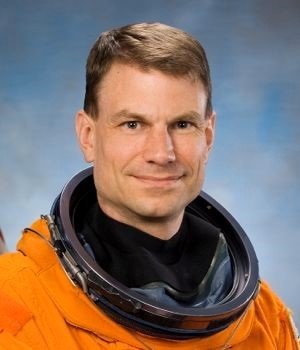NASA astronaut Stan Love to discuss space exploration as Rowan marks 50th anniversary of Apollo 11 mission
NASA astronaut Stan Love to discuss space exploration as Rowan marks 50th anniversary of Apollo 11 mission
The 50th anniversary of the Apollo 11 flight that landed men on the moon will take center stage at Rowan University on Thursday, April 4, as the University community welcomes NASA astronaut Dr. Stan Love.
Love, a mission specialist astronaut from 1998-2011, will present “The Past, Present, and Future of Space Exploration” at 6:30 p.m. in the Eynon Ballroom of the Chamberlain Student Center, 201 Mullica Hill Road, Glassboro. His address is free and open to the public and will include a question-and-answer session.
 Love was capsule communicator and/or crew support astronaut for a host of station expeditions and shuttle missions.
Love was capsule communicator and/or crew support astronaut for a host of station expeditions and shuttle missions.
In 2008, he logged more than 306 hours in space and more than 15 hours on two spacewalks as a crew member of STS-122 Atlantis. The mission to the International Space Station involved carrying the European Space Agency’s Columbus laboratory model to the station and completing a permanent installation. Love’s flight duties included performing two spacewalks to help prepare the Columbus laboratory, to add two science payloads to the outside of the Columbus and to carry a failed gyroscope to the shuttle for a safe return to Earth.
Altogether, he spent 12 days, 18 hours, 21 minutes and 40 seconds on the mission, traveling nearly 5.3 million miles in 203 Earth orbits.
In 2002, Love and Ed Lu, a fellow astronaut, co-invented the gravity tractor, a novel method to controllably modify the orbits of hazardous asteroids.
Love, who holds a doctorate in astronomy from the University of Washington in Seattle, currently serves as the crew office representative for NASA’s Space Launch System. In that role, he helps to plan for human exploration of asteroids, the moon and Mars.
'Reflections on the Space Race and the Cold War'
In addition to his evening keynote address, Love also will participate in “50 Years After Apollo 11: Reflections on the Space Race and the Cold War,” a panel discussion that begins at 2 p.m. in Room 144 of the Chamberlain Student Center.
Panelists also will include Rowan history professor Jim Heinzen, an expert in the history of modern Russia, and Fordham University historian Asif Saddiqi. Saddiqi is author of Challenge to Apollo: The Soviet Union and the Space Race, 1945-1974, the single best study of the Soviet space program. He currently serves on the United States National Research Council’s Committee on Human Spaceflight, tasked by Congress to evaluate and recommend options for the future of NASA's human spaceflight program.
On July 20, 1969, Apollo 11 astronauts Neil Armstrong and Buzz Aldrin became the first two people to land on the moon. The mission ended the Space Race between the United States and the then-Soviet Union.
Love’s keynote and the panel discussion are sponsored by the Office of the President, the Provost’s Office, the colleges of Humanities & Social Sciences and Science & Mathematics/School of Health Professions, and the School of Earth and Environment.